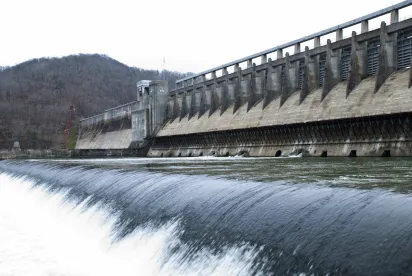On January 25, 2019, in Hoopa Valley Tribe v. FERC, the U.S. Court of Appeals for the D.C. Circuit (D.C. Circuit) concluded that a Federal Energy Regulatory Commission (FERC) hydroelectric licensee’s repeated withdrawal and resubmission of water quality certification requests under Section 401 of the Clean Water Act (CWA) pursuant to a written agreement with state water quality agencies does not trigger a new statutory period of state water quality review. The D.C. Circuit held that, as a consequence, FERC acted arbitrarily and capriciously by not concluding that the States of California and Oregon had waived their water quality authority under Section 401. The D.C. Circuit’s opinion does not appear limited to the particular facts of the case and thus could radically alter the relationship between FERC and state water quality agencies in the relicensing process.
BACKGROUND
Under Section 401 of the CWA, any applicant seeking a federal license for an activity that “may result in any discharge into the navigable waters” must first seek water quality certification from the state(s) in which the project is located. FERC may not issue a new license authorizing the continued operation of a hydroelectric project unless the state water quality certifying agency has either issued a 401 certification or waived certification by failing to act on a request for certification within a reasonable period of time, not to exceed one year, from receipt of the request.
The Klamath Hydroelectric Project is located primarily on the Klamath River in Klamath County, Oregon, and Siskiyou County, California. PacifiCorp, the licensee of the Klamath Project, filed an application with FERC to relicense the Project in 2004. In 2006, PacifiCorp filed applications for 401 certifications with the California State Water Resources Control Board (California Water Board) and Oregon Department of Environmental Quality (ODEQ). After years of disputes with federal and state resource agencies over the appropriate environmental conditions to be included in a new license, in 2010, PacifiCorp entered into a settlement that provided for the future removal of four Klamath River dams. As a condition of the settlement, the states and PacifiCorp agreed to defer the one-year statutory deadline for Section 401 approval by annually withdrawing and re-filing the 401 applications to avoid the certifications being deemed waived under the CWA. In 2016, the settlement agreement was amended, among other things, to contemplate transfer of the license to a new entity, the Klamath River Renewal Corporation (KRRC), which would be responsible for obtaining necessary permits and carrying out the dam removals. After the KRRC filed a plan with FERC to decommission the dams, PacifiCorp withdrew its 401 applications for relicensing. The KRRC then submitted 401 applications for the proposed dam removals.
In May 2012, the Hoopa Valley Tribe (Tribe) filed a petition for declaratory order asking FERC to find that PacifiCorp had failed to diligently prosecute its licensing application and thus should be required to remove the dams at its own expense, or, in the alternative, that the California Water Board and ODEQ had waived their authority to issue water quality certifications for the Project and that FERC should promptly issue a new license with appropriate environmental protections. The Tribe argued that the states’ failure to act within one year and their agreement with PacifiCorp not to do so amounted to a waiver under the CWA, and that FERC violated its statutory duties by failing to act on the relicensing application and allowing PacifiCorp to operate the dams under a 1956 license. FERC denied the petition, finding that while the arrangement was inconsistent with the spirit of the CWA, the withdrawal and resubmission of a 401 application is a new request that establishes a new one-year deadline for the state’s action under the CWA. The Tribe sought judicial review of FERC’s orders. While the D.C. Circuit agreed to hold the case in abeyance for a time pending FERC’s action on the license transfer and surrender applications, the D.C. Circuit eventually lifted the abeyance, held oral argument, and rendered its decision on the merits.
DECISION
In a unanimous opinion authored by Judge Sentelle, the D.C. Circuit held that FERC acted arbitrarily and capriciously by finding that the states did not waive their 401 authority. The D.C. Circuit found that PacifiCorp’s withdrawals and resubmissions were not new requests at all, and did not restart the one-year clock for the states to act on the requests. Instead, the D.C. Circuit found that the states’ actions constituted a failure or refusal to act under the plain meaning of the CWA, constituting a waiver of their authority. The D.C. Circuit determined that the “coordinated withdrawal-and-resubmission scheme” under the dam removal settlement did not exploit a statutory loophole, but rather circumvented the exclusive authority delegated to FERC by Congress over hydropower licensing. The D.C. Circuit concluded that if this was permitted to continue, the withdrawal-and-resubmission scheme could be used to indefinitely delay federal licensing proceedings and undermine FERC’s jurisdiction to regulate such matters. In response to the argument that a one-year review period could result in incomplete applications and premature decisions, the D.C. Circuit found that “it is the role of the legislature, not the judiciary, to resolve such fears.”
Implications
The facts in the Klamath case are fairly extreme in that the licensee and the states by written agreement had committed to the coordinated withdrawal and resubmittal scheme, and that the process had been ongoing since 2006. However, the D.C. Circuit also commented on the broader issue of delays in FERC relicensing as a result of such practices, noting that at the time of briefing, 27 of the 43 licensing applications before FERC were awaiting 401 certification, some for more than a decade. As the D.C. Circuit stated: “By shelving water quality certifications, the states usurp FERC’s control over whether and when a federal license will issue. Thus, if allowed, the withdrawal-and-resubmission scheme could be used to indefinitely delay federal licensing proceedings and undermine FERC’s jurisdiction to regulate such matters.”
Although not discussed in the decision, some states including California have put in place comprehensive environmental review processes as part of their 401 certification decision making which in many ways duplicate the FERC licensing process, and which no longer appear to fit easily within the one-year certification window. As a consequence of the D.C. Circuit’s ruling, FERC now appears to have a mandate to reassert control over and shorten the length of the licensing process.
Further, since applicants for FERC gas pipeline certifications, dredge and fill permits from the U.S. Army Corps of Engineers under CWA Section 404, and other federal permits that involve discharges into navigable waters also must obtain 401 certifications or waivers, the implications of the D.C. Circuit’s opinion in the Klamath case go far beyond FERC hydroelectric licensing.
Parties to the case have 45 days to file for rehearing before the D.C. Circuit, and 90 days to file a petition for a writ of certiorari with the U.S. Supreme Court. The States of California and Oregon participated in the case as amici curiae and thus are not parties. PacifiCorp did not brief the CWA 401 waiver issue. Other parties to the case include American Rivers, Trout Unlimited, California Trout, Siskiyou County, and various Klamath water users.




 />i
/>i

